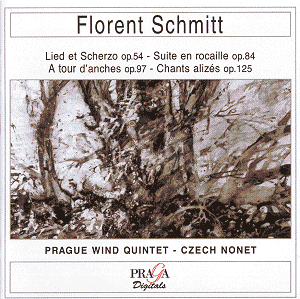 |
Florent SCHMITT (1870-1958)
Crotchet
AmazonUK
AmazonUS |
Schmitt, a close contemporary and some-time friend of Vaughan Williams, is a composer of bejewelled music whose legacy might be seen as an echo of, or even the original to, the music of two other contemporaries: Arnold Bax in the UK and Joseph Marx in Austria. He had no truck with atonalism or with neo-classicism. Instead he charted a course through the tonal Pleiades. Profusion of ideas and an immersive delight in lush lyricism can be found in his early orchestral works thought this slimmed down somewhat for the fine (and, needless to say, unrecorded) cello concerto (in all but name) Introit, Récit et Congé - a work of the 1930s.
The Lied et Scherzo (for horn solo and wind nonet - all but a chamber orchestra) touches off small explosions of recognition in the direction of Dvorák, Bax (strongly) and Vaughan Williams. This is a fantastic essay around high summer's drowsing and its revelry - an uncanny shadow to Bax's unnumbered symphony Springfire of only three years later and the Englishman's much later Third Symphony. There seems to have been something in the trans-Manche air at the time. Twenty-four years later, touched partly by Stravinsky's 'nut-brittle', comes the Suite en Rocaille - which is rife with Fauré and the Masque; civilised and graceful but without the boredom of the predictable. The finale is something of a Gallic hoedown. Á Tour d'Anches comes from two years after the war. Its swooning meandering and the bassoon's congeries around the mysterious theme from Stravinsky's Rite prepare the way for a rocking theme which partakes as much of nightmare as of comfort. The Chants Dalizé represents a tarter mix, with a lovely Lent and a witty finale bubbling with gallantry, a wink and a chuckle.
There was room for the 1946 Quartet for three trombones and tuba as well as the Saxophone Quartet, and the Sonatine en trio for flute, clarinet and harpsichord. I am rather sorry that they could not have been included.
For the growing league of Schmitt enthusiasts as well as those who still prize astutely written music for wind ensemble. Complemented by helpful notes from Pierre E Barbier.
Rob Barnett